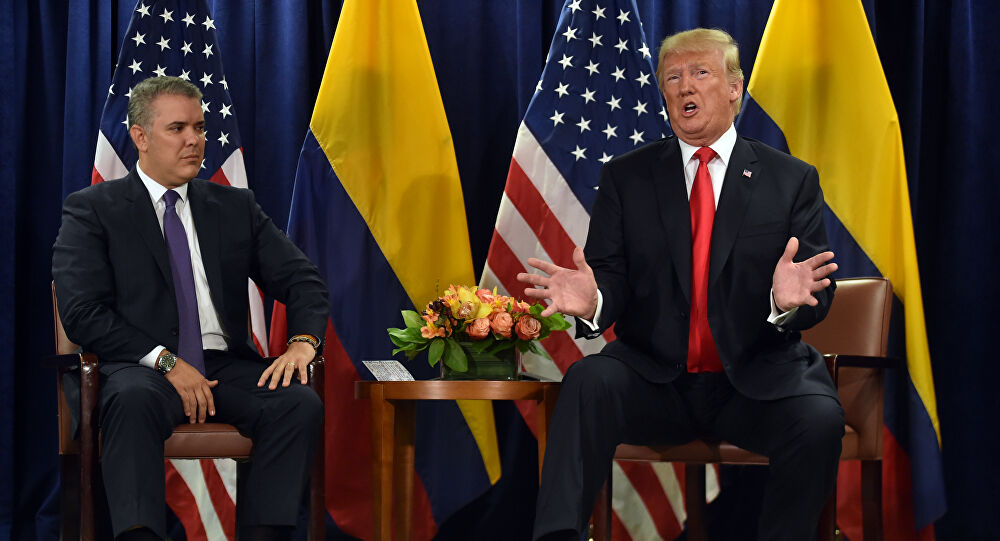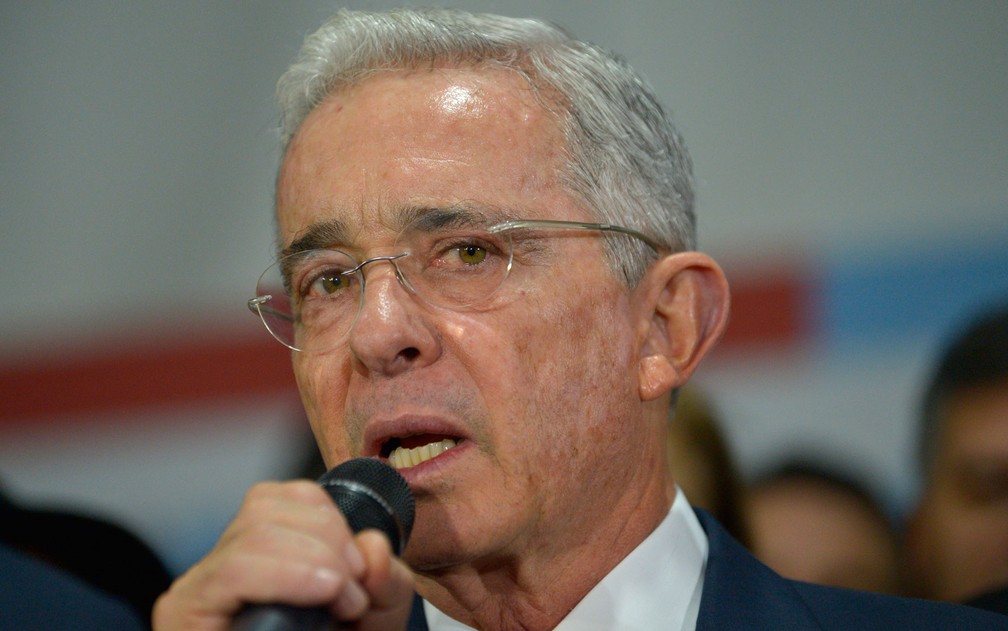RIO DE JANEIRO, BRAZIL – US President Donald Trump has ensured that Colombia figures in his campaign for reelection amid the intense struggle with Democrat Joe Biden to win the Latin vote in Florida, the most important among the so-called pendulum states.
Among his recent messages of support for ex-president Álvaro Uribe, Iván Duque’s political mentor, the Republican even recycled references to “castro-chavism,” the term used by the Colombian right-wing gathered around the ruling party to attack the peace agreement sealed by Juan Manuel Santos with the now-extinct FARC guerrillas.
Trump worked against this hard-won pact, which enabled the disarmament of 13,000 rebels. The once Revolutionary Armed Forces of Colombia became a political party with ten seats in Congress. “The former administration negotiated the terrible Obama-Biden-Santos treaty with the Colombian drug cartels, surrendered to the narco-terrorists, and caused drug production to increase,” Trump said last month at an event in Miami, rhetoric that recalled the most radical positions of Uribe.

Colombian society seeks to turn the page on violence. Duque, elected two years ago with the support of the sectors that opposed the Havana talks, must implement an agreement that had the decisive support of the bulk of the international community. Stranded since its signing four years ago in the crossfire of Colombian political polarization, the peace agreement now sees its fragile implementation jeopardized amid the US campaign’s polarization.
Abundant criticism of Duque’s stance on the agreements, which he vowed not to “destroy,” as the most uncompromising sectors of his party demand, has acquired a new hue this week. “The agreement is not being implemented satisfactorily,” assessed Bernard Aronson, who was a special US delegate to follow the Havana talks during the Barack Obama era, an undeniable support for the negotiation.
“Obama’s support of the peace agreement was absolute. A total of US$450 million (R$2.5 billion) was set aside for the so-called Colombia Peace Plan, and when the new administration came, Donald Trump tried to extinguish everything that had been done. The only issue Trump seems to be interested in relation to Colombia is the amount of coca production,” added the American diplomat in an interview with the newspaper El Espectador.
The reaction was not long in coming. In an unusual surge of diplomatic tone, the Colombian ambassador in Washington, Francisco Santos, Uribe’s former vice-president, replied to Aronson’s criticism. “His remarks dramatically ignore reality about our conviction to progress in the fulfillment of commitments agreed upon through the policy of Peace with Legality. The progress speaks for itself,” said the ambassador. However, several voices are questioning the political will of Duque’s Executive to implement the pact, and his ambiguity has claimed a price.
Colombia must proceed to a new stage with a greater territorial focus, particularly where the state’s presence has been precarious, stressed the Kroc Institute for International Peace Studies in June. The institute, in charge of monitoring the agreement, issued its fourth report, which covers the period from December 2018 to November 2019, the third year after it was signed at the Teatro Colón in Bogotá. During this time, the overall progress of implementation was barely six percent, a lower figure than in earlier years.
Trump’s potential re-election would plunge the peace plan into crisis, alerts internationalist Laura Gil, heavily involved in Defend Peace, a civic platform to support the pact. “So far it has been a matter of containing the Government’s ability to destroy peace. If Trump wins, the empowerment to actually destroy it increases greatly. What there is, is a waiting moment for everyone to see what will happen in these elections,” she says.
“Aronson’s criticism is the same as many advocates of the peace agreement in Colombia. The government doesn’t like to be contradicted by figures who have a diplomatic weight and a credibility that make their arguments fall by their own weight,” says Sergio Guzmán, director of the consulting firm Colombia Risk Analysis. “The international community has an important role in ensuring that the Colombian government fulfills its commitments as a state,” he says.
But “under the Trump government it didn’t matter, because in reality what matters to it in relation to Colombia is not peace, but rather drug trafficking and its position on Venezuela,” he adds. Under a Democratic administration led by Obama’s former vice-president Biden, it would be a different matter.
Duque himself acknowledged that his relationship with Washington is “narcotized” by the high levels of narcotics cultivation inherited by his government. Colombia had 154,000 hectares of illegal crops by late 2019, according to official figures. The Colombian executive proposes to reinstate the controversial aerial spraying with glyphosate, a potentially carcinogenic herbicide suspended for use in 2015, but Trump’s White House is promoting it insistently despite voluntary replacement programs arranged with the farmers who signed the agreements.

The battle for transitional justice
The Democratic Center, the government party founded by Uribe and the most fierce critic of the agreements, attacks with particular severity the transitional justice system in charge of judging the most serious crimes that occurred during the armed conflict. Duque proposed changing the Special Jurisdiction for Peace (JEP) in 2019, considered the backbone of the pact, with a number of objections that suffered a resounding defeat in Congress.
However, Uribe on Monday mentioned in his first statement after the Court ordered his release after more than two months of house arrest for a case of witness tampering, to revoke the JEP and reform the agreements.
This view contrasts with that of the UN fact-finding mission in the country. “The process of transitional justice is gaining momentum,” said Carlos Ruiz Massieu, the mission chief, in his quarterly report to the Security Council. “In recent weeks, several of the FARC party’s main leaders have acknowledged their responsibility for the role they played in different crimes committed during the conflict, strongly demonstrating that the peace process is beginning to fulfill its promise to mitigate the horrors of the past, which is a key element in healing Colombian society,” he said.
Duque’s Executive has one speech -before the UN he says he is committed to ensuring that the JEP fulfills its purpose – while the Government party is committed to ensuring that it does not, says Guzmán. “There is a mixed diplomacy on the issue that with Trump is tolerable to the United States, but in a different scenario I don’t think this Colombian position is as attractive,” he says.
“Internationally, this dual discourse of not doing it in Colombia, and saying it is done, is already exhausted,” agrees Laura Gil.
Source: El País

